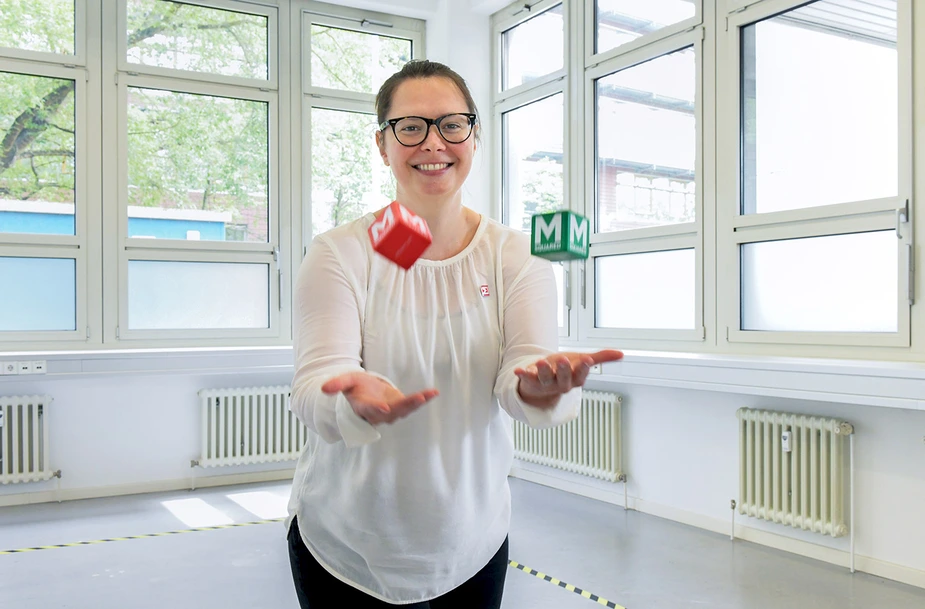A point guard in the quantum world
The Scottish photonics specialist M Squared now has a facility in Adlershof
M Squared has made a name for itself in the photonics industry as a provider of high-end lasers and instruments for use in quantum technology, biophotonics, and chemical sensing. The Glasgow-based company is now building an up-close relationship with the optics and photonics cluster in Berlin-Brandenburg – and a new location in Adlershof. Gabrielle Thomas, a physicist, is the ‘point guard’ of the operation.
More than 90% academics. Ninety percent of sales made outside of the UK. Locations in Silicon Valley, Cambridge, London – and now in Adlershof. Over the course of 14 years, the Scottish photonics specialist M Squared has matured into a global technology company with almost 120 employees. Its products are the keys to its success: high-precision lasers with ultra-narrow spectral linewidth. Many of them are tunable across a wide range of wavelengths. M Squared’s product range also includes reliable ultra-short pulse lasers and high-resolution microscopes that are used by neuroscientists, developmental biologists as well as cancer researchers.
In addition to biophotonics, M Squared has two more key fields of activity: the Scots are leaders in chemical sensing and quantum technology. Their lasers are used in high-precision atomic clocks, in quantum gravimeters, and in quantum computing systems, which the company is also involved in developing. ‘We are currently leading a project that realises navigation systems based on quantum sensor technology instead of satellite data,’ says Gabrielle Thomas, who is in charge of setting up the new location in Adlershof. Other projects deal with ion thrusters used in spacecrafts, detecting poisonous gases or leaks in oil and gas pipelines, and evidence-based diagnosis of biomarkers in the breath of patients — and sometimes even theft: when maturing high-end whiskeys, for example, sensors can detect the amount of evaporating liquids and deprive the angels of their proverbial share.
Using optical sensors, manufacturers can not only minimise their losses. ‘It’s also possible to use it to determine the authenticity and even the age of a whiskey,’ says Thomas.
M Squared will coordinate services and sales for German-speaking countries from Adlershof and, in the future, work on research and development projects. ‘We have rented office and lab space at the IGZ Innovation and Start-up Centre for this purpose,’ says the physicist. She studied and earned her PhD at Imperial College London, where she worked on a project on developing diode-pumped solid-state lasers for active, satellite-based remote environmental sensing supported by the European Space Agency (ESA). In 2017, she started working at Max Born Institute for Nonlinear Optics and Short Pulse Spectroscopy (MBI) in Adlershof.
It was actually her husband who gravitated towards the MBI first. When the institute’s management heard that he had a highly qualified laser researcher at his side, she was invited for a job interview and was offered the opportunity to work in a team dealing with developing so-called optical parametric chirped pulse amplifiers for use in attosecond research.
And so she was torn when M Squared offered her to build up a location and a network in the photonics region Berlin-Brandenburg. ‘I had gotten to know and appreciate the company when I was at Imperial College,’ she says. She was faced with a fundamental decision: research or industry. Since M Squared is very research-oriented, she hopes to be able to make the best of both worlds. The labs are fully furnished, the universities in the region offer many potential employees as well as potential partners for future projects. The latter is underscored by the lively photonics cluster Berlin-Brandenburg as well as the recent dynamism in the quantum research world, which is being stimulated by massive research funding by the EU and the federal government. Thomas, the ‘point guard’, is convinced that M Squared will play a significant role in this field.
By Peter Trechow for Adlershof Journal
